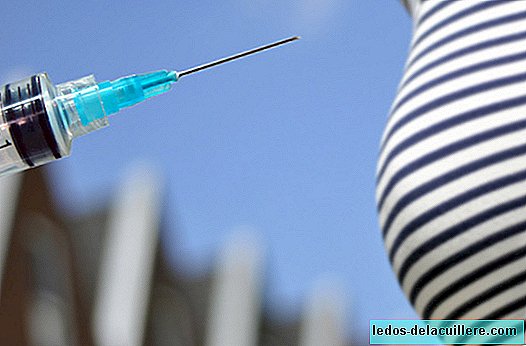When we know the theory of what should be done and compare it with what is finally carried out, sometimes we get more of a surprise. In the case of vaccines in pregnancy, they inform you that the mother's vaccination status should be part of the pregnancy planning or, where appropriate, should be among the topics that are treated at the first visit to the gynecologist or the midwife.
This issue did not concern me in any case, I do not remember at any time that the gynecologist or the childbirth preparation classes dealt with it. I didn't have to worry about looking for my vaccination book (which might have been a bit complicated) nor did anyone tell me that I should get this or that vaccine ... To you, Did anyone ask you if you were vaccinated during pregnancy?
The answer is probably no, so I have been able to check in my environment. There are studies that indicate that up to 95% of gynecologists think that the flu vaccine should be recommended during the second or third trimester of pregnancy to healthy pregnant women, but in practice only about 37% prescribe it. The more outdated the healthcare professional is in this regard, the less he will worry about recommending vaccination to the pregnant woman.
In a study with a sample of gynecologists and midwives health professionals, 20% of respondents were unaware that pregnant women had a higher risk of morbidity for influenza and 55% ignored that the newborn could benefit from immunity transferred by Mother placental route.
Are future moms too distorted? Do we sin of tranquility in this regard? It is not that you want to add one thousand and one concerns of the pregnant one more, but it is that vaccines can be an important benefit and result in the health of the woman and her baby. We refer to the vaccines recommended in pregnancy.

Vaccines during pregnancy
The first thing to note is that it is recommended that health professionals know the vaccination history of each woman, and depending on this offer different types of vaccines before and during pregnancy. There are some inactivated vaccines recommended in special situations, others that are not recommended in any case ... but we will focus on those that are recommended and should be recommended even if we never heard of them during our pregnancy.
Flu vaccine. Vaccination against influenza is a strategy with proven effectiveness and that indications about risk groups, including pregnant women, are clearly defined by the Advisory Committee on Immunization Practices (ACIP) of the Centers for Disease Control and Prevention (CDC) of the United States. Since 1997, the ACIP recommends the influenza vaccination of pregnant women in the second or third trimester of pregnancy. when this coincides with the flu season. In 2004, this indication was extended to pregnant women in any trimester of pregnancy. This is the recommendation that most health systems collect. However, in a study carried out in Catalonia (Vall de Vall d'Hebron University Hospital between 2007 and 2008) on vaccination coverage in pregnant women and knowledge and practices of gynecologists, it was observed that vaccination coverage against influenza in pregnant women attended was less than 5%.
Whooping cough vaccine. Cases of whooping cough are increasing in the world, especially in infants under three months of age, and therefore the possibility of vaccinating whooping cough is considered for all pregnant women. Most pregnant women do not have enough protective antibodies against pertussis to transmit them effectively through the placenta to their newborn children during pregnancy or through breastfeeding, so they do not give them sufficient protection against to the infection during those first months of life. Therefore, the maternal vaccination is proposed between weeks 30 and 32 of each pregnancy, so that specific antibodies reach their peak when transplacental transport is more efficient (from week 34 of gestation). Countries like the United States and the United Kingdom already include this vaccine in the programs. In Spain, since 2015 the Ministry of Health, Social Services and Equality recommended that the autonomous communities start the vaccination of pregnant women, and although in many cases we ask ourselves: where is the vaccine ?, it seems that its implementation should already be in all the country. The available vaccines are combined with other vaccines, so that it protects against pertussis, diphtheria and tetanus at the same time.
Vaccine against tetanus and diphtheria. During birth there is a risk of tetanus infection, both for the mother and for the newborn, so the pregnant woman must be properly immunized before it. As we have just seen, there is a vaccine against tetanus (it is recommended if the pregnant woman has not been immunized in the last 10 years), diphtheria and pertussis (dTpa) that has proven its effectiveness.
Anyway, after seeing the panorama, in which the universal recommendations do not exist, in which each country and each community receives a different protocol ... they may never ask you during pregnancy if you were vaccinated or advise you to put yourself Certain vaccines
However, the tendency is to admit the importance of immunization in these cases and the effectiveness of vaccines, so that pregnant women are likely to hear about vaccines. And this despite the ignorance of some professionals, despite the reluctance or perceptions against a part of the population. In any case, it will depend on your particular case, since as we have pointed out, there are other vaccines recommended in special situations, when traveling ... If your gynecologist doesn't ask you about it, ask him.
Photos | iStock
More information | GVA, AEPAP
In Babies and more | Better to prevent ... What vaccines should I get in pregnancy?












